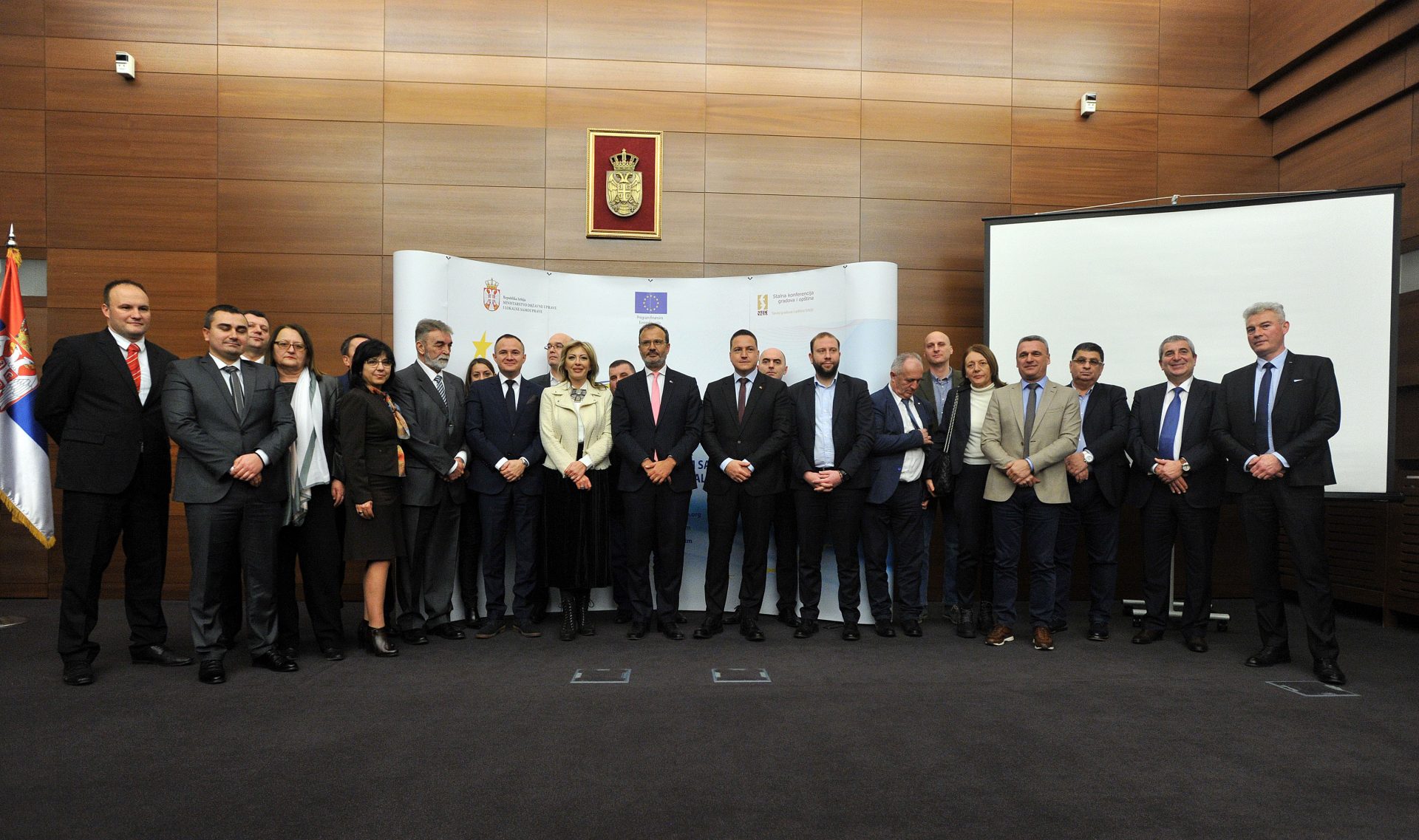
The official ceremony which marked the beginning of the execution of the grant scheme of the Exchange 5 Programme was held in Belgrade on 22 january 2019. A meeting organised by the Ministry of Public Administration and Local Self-Government (MPALSG), the Department for Contracting and Financing of EU Funded Programmes of the Ministry of Finance, and the Standing Conference of Towns and Municipalities (SCTM), marked the beginning of the execution of 18 projects in the total value of 3.5 million EUR, which will improve the public property management programme in 48 local self-governments. The programme is financed by the European Union from allocations for IPA 2014, and implemented by MPALSG in collaboration with the Department for Contracting and Financing of EU Funded Programmes of the Ministry of Finance of the Ministry of Finance (CFCU) and SCTM as the Implementation Partner.
On this occasion, Branko Ružić, Minister of Public Administration and Local Self-Government, said that municipalities, towns and their partner organisations had successfully passed the selection process for receiving grants from EU funds.
“Property management is an area which requires fundamental organisation, because, in order for local self-governments to properly dispose of their assets, gain earnings therefrom or use them to satisfy the needs of citizens, it is important that they know what it is that they own”, said Ružić
He noted that a set of regulations was adopted the previous year, ensuring a higher public participation in the activities of local authorities, enhancement of capacities of civil servants in local self-governments and better regulation of the procedure of registering immovable public property and the municipal property management procedure itself. The Minister is convinced that such legal foundations and support we gain through the Exchange 5 programme will contribute to efficient property management, strategic planning and programming budgeting on the local level.
Jadranka Joksimović, Minister of European Integration, stated that the Exchange 5 Programme, as a part of the EU international development aid, is a preparation for the inclusion of Serbia into European cohesion policy.
“We are in the process of learning how to apply European principles of political solidarity in Serbia, and it is very important that there is good coordination between the Ministry of European Integration, Ministry of Public Administration and Local Self-Government and Ministry of Finance”, said Joksimović.
In her words, local self-governments in Serbia should enhance their capacities to use EU structural funds, and SCTM has a big role in this.
“It is important that all local self-government units be interested for these topics, because the good effects of the EU programme may only be achieved if there is cooperation on all levels of governance”, stated the Minister.
Sem Fabrizi, Head of Delegation of the European Union to the Republic of Serbia, said that the role of local authorities in Serbia’s EU accession process is important because the main interactions between citizens and the public administration are on the local level.
“Capacities of local self-governments in Serbia must be enhanced, having in mind that over 60% of EU regulations need to be implemented on the local level”, said Fabrizi. He added that local self-government must be strengthened in order to have direct benefits from the implementation of acquis.
Slavica Savičić, State Secretary in the Ministry Finance, noted that amendments and supplements to the Law on Public Property were adopted last year, and, in her words, considerably contributed to the reinforcement and enhancement of capacities of civil servants in local self-governments.
“These changes are a better way to regulate the procedure of registering immovable public property, as well as the municipal property management procedure itself. She stated that property management should be “rational, moderate and with an adequate legal basis”.
Marko Jovanović, Assistant Minister of Finance and Head of the Department for Contracting and Financing of EU Funded Programmes, said on this occasion that projects under the grant scheme of the Exchange 5 Programme include 48 local self-government units, out of which 18 are grant coordinators, and other 30 are partners. Cited programme and grant scheme are a part of IPA 2014, second programme which is implemented according to the decentralized EU fund management system. He emphasized that CFCU, in collaboration with relevant ministries and institutions, had recently achieved great success in negotiating the very same IPA 2014 programme, with the contracting rate of over 90%, or over 59 million EUR, which points to a strong commitment and efforts of all participants in the process of the management of funds and projects financed by the European Union.
Đorđe Staničić, Secretary-General of SCTM, said that the Standing Conference of Towns and Municipalities has been a partner in EU projects of capacity enhancement of self-governments in Serbia since 2004.
“So far, over 33 million EUR has been invested in such projects. Local self-governments invested around 550,000 EUR, or around 16% of total funds, into projects implemented under the grant scheme of Exchange 5”, pointed out Staničić.
Exchange5 programme is a part of current processes in which Serbia, with EU support, invests efforts to improve the management in the local self-government and raise the service level in towns and municipalities for the purpose of promotion of local development. Topics of the Exchange 5 Programme are for the purpose of local reform processes and refers to the following: support to efficient property management and support in strategic planning and programme budgeting.
Total value of the Exchange 5 Programme from EU funds is 4.45 million EUR, out of which 3 million EUR is the fund for execution of projects under the grant scheme for property management. From the remaining donation funds, expert support was provided to local self-governments both in the area of property management and in the area of programming and capital budgeting, which was realized in coordination with line ministries, through SCTM.



